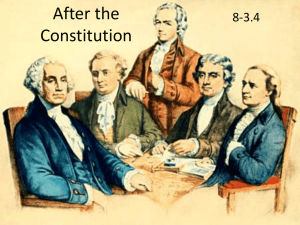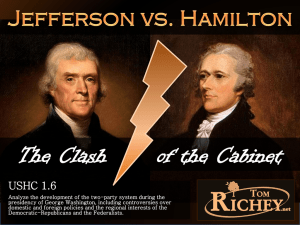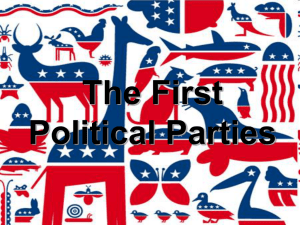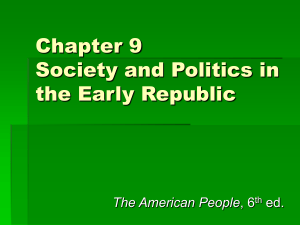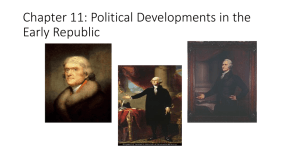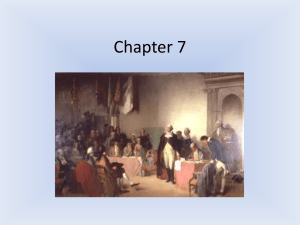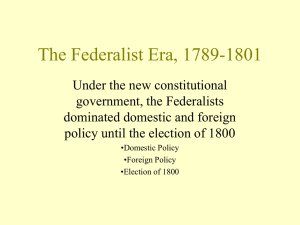Standard 8-3: The student will demonstrate an understanding of
advertisement
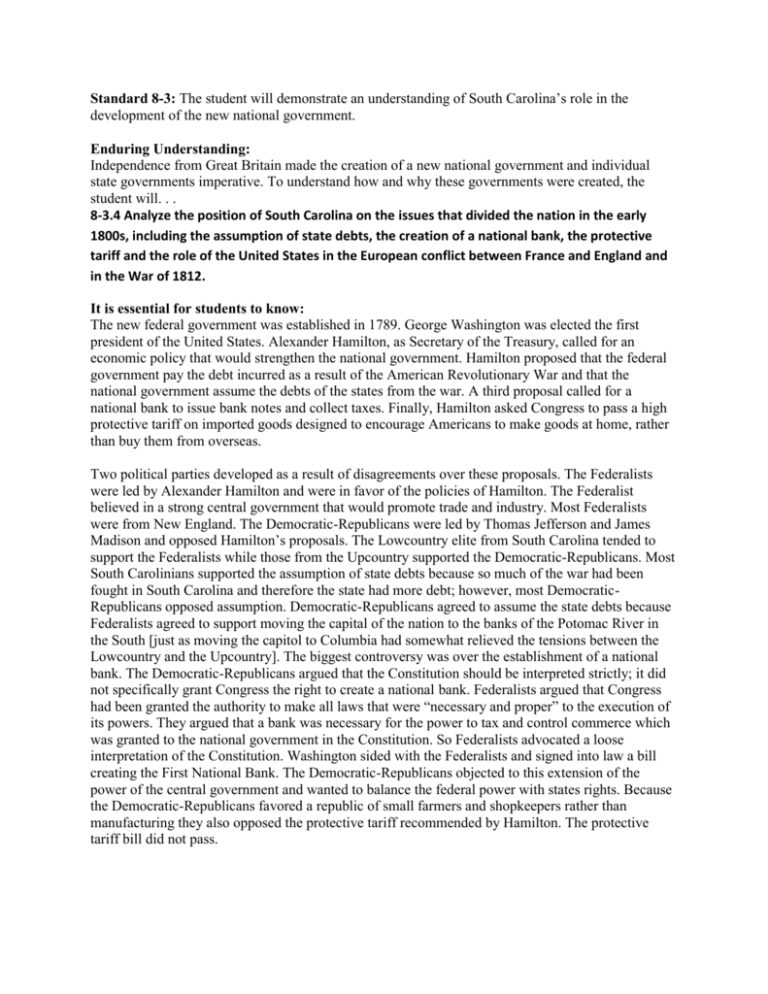
Standard 8-3: The student will demonstrate an understanding of South Carolina’s role in the development of the new national government. Enduring Understanding: Independence from Great Britain made the creation of a new national government and individual state governments imperative. To understand how and why these governments were created, the student will. . . 8-3.4 Analyze the position of South Carolina on the issues that divided the nation in the early 1800s, including the assumption of state debts, the creation of a national bank, the protective tariff and the role of the United States in the European conflict between France and England and in the War of 1812. It is essential for students to know: The new federal government was established in 1789. George Washington was elected the first president of the United States. Alexander Hamilton, as Secretary of the Treasury, called for an economic policy that would strengthen the national government. Hamilton proposed that the federal government pay the debt incurred as a result of the American Revolutionary War and that the national government assume the debts of the states from the war. A third proposal called for a national bank to issue bank notes and collect taxes. Finally, Hamilton asked Congress to pass a high protective tariff on imported goods designed to encourage Americans to make goods at home, rather than buy them from overseas. Two political parties developed as a result of disagreements over these proposals. The Federalists were led by Alexander Hamilton and were in favor of the policies of Hamilton. The Federalist believed in a strong central government that would promote trade and industry. Most Federalists were from New England. The Democratic-Republicans were led by Thomas Jefferson and James Madison and opposed Hamilton’s proposals. The Lowcountry elite from South Carolina tended to support the Federalists while those from the Upcountry supported the Democratic-Republicans. Most South Carolinians supported the assumption of state debts because so much of the war had been fought in South Carolina and therefore the state had more debt; however, most DemocraticRepublicans opposed assumption. Democratic-Republicans agreed to assume the state debts because Federalists agreed to support moving the capital of the nation to the banks of the Potomac River in the South [just as moving the capitol to Columbia had somewhat relieved the tensions between the Lowcountry and the Upcountry]. The biggest controversy was over the establishment of a national bank. The Democratic-Republicans argued that the Constitution should be interpreted strictly; it did not specifically grant Congress the right to create a national bank. Federalists argued that Congress had been granted the authority to make all laws that were “necessary and proper” to the execution of its powers. They argued that a bank was necessary for the power to tax and control commerce which was granted to the national government in the Constitution. So Federalists advocated a loose interpretation of the Constitution. Washington sided with the Federalists and signed into law a bill creating the First National Bank. The Democratic-Republicans objected to this extension of the power of the central government and wanted to balance the federal power with states rights. Because the Democratic-Republicans favored a republic of small farmers and shopkeepers rather than manufacturing they also opposed the protective tariff recommended by Hamilton. The protective tariff bill did not pass. Federalists and Democratic- Republicans also disagreed over foreign policy. When the French Revolution began in 1789, the Democratic-Republicans supported the French in the overthrow of their king. The Federalists were appalled at the bloodshed and, when the French declared war on Britain, sided with the mother country hoping to secure more trade. George Washington issued a Proclamation of Neutrality and the United States attempted to remain neutral in the Napoleonic Wars. President John Adams sent South Carolinian Charles Cotesworth Pinckney to negotiate peace with France. Pinckney and two other Americans met with three representatives of the French government (X, Y, and Z) who asked for a bribe. Incensed, Pinckney replied, “No, no, not a sixpence.” The incident became known as the X, Y, Z Affair and brought the emerging political parties into conflict. While Federalists prepared for war, Democratic-Republicans vilified President John Adams in their party newspapers. Incensed at this insult, Federalists passed the Alien and Sedition Acts designed to limit the growth of the Democratic –Republican Party and to silence its newspapers. Several newspaper publishers were jailed. [Including Thomas Cooper after whom the libraries at USC and Clemson are named] and Democratic –Republicans decried this attack on freedom of the press. Jefferson and Madison wrote the Virginia and Kentucky Resolutions saying that states had the right to nullify an act of Congress that they found to be unconstitutional such as the Alien and Sedition Acts. These resolutions became a foundation of the states’ rights doctrine [espoused by John C. Calhoun and put into practice first in the Nullification Controversy (8-4.3) and later in secession.] Controversy over the Alien and Sedition Acts contributed to the election of Thomas Jefferson as president in 1800. The Napoleonic Wars continued and Americans traded with both the British and the French. The British practice of impressment, pressing into service American sailors they claimed were British citizens, became a major grievance. In 1807, Congress passed the Embargo Act to stop American trade with both Britain and France. The embargo devastated the American shipping industry based in New England, a Federalist region. Federalists opposed both the embargo and later the War of 1812. Democratic-Republicans living in the West accused the British of urging Native Americans to attack American settlers. When a British ship fired on an American ship, protest meetings were held all over South Carolina. In 1810, War Hawk John C. Calhoun was elected to Congress from South Carolina and urged Congress to declare war on Great Britain. In 1812, the United States declared war on Great Britain and invaded Canada where the American army was defeated. In 1814, a British army attacked Washington, D. C. and set fire to the capital and the president’s house [later the White House]. Although the treaty that ended the war brought no exchange of lands [status quo antebellum], the War of 1812 brought a new surge of nationalism. The Federalist Party died as a result of their opposition to the war and the Democratic-Republicans including John C. Calhoun, began to support Federalist policies including a protective tariff and the national bank.

